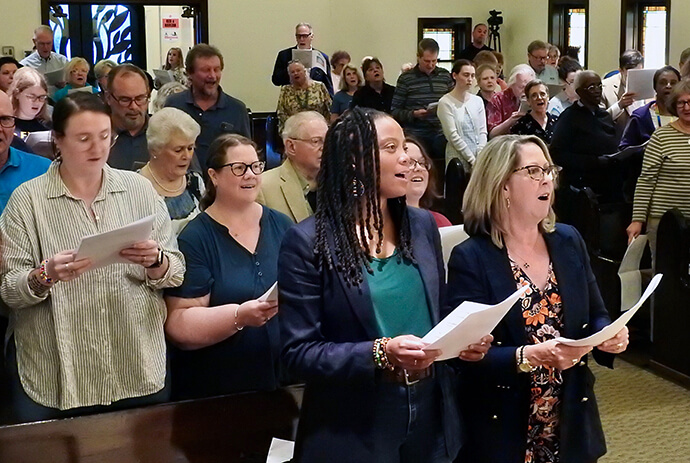Key points:
- A celebration of one year of full inclusion for LGBTQ persons in The United Methodist Church took place May 1 in Dallas.
- Greenland Hills United Methodist Church announced a $20,000 gift for the Center for LGBTQ+ United Methodist Heritage.
- Retired Bishop Karen Oliveto said The United Methodist Church must reclaim the “lost narratives” of gay Methodists over the generations.
Long defrocked, now reinstated, the Rev. Beth Stroud helped lead communion at a service marking the first anniversary of The United Methodist Church’s move to full LGBTQ inclusion.
Stroud was happy but shaky as she stood offering the elements.
“Some of us are out of practice,” said Stroud, who was ousted as a lesbian United Methodist clergywoman in 2004. “This is only the third time in the past 20 years I’ve done this.”
Nearly 200 people attended the May 1 service at Dallas’ Greenland Hills United Methodist Church, with others joining via livestream. The service was co-sponsored by the Center for LGBTQ+ United Methodist Heritage and Greenland Hills United Methodist.
Speakers celebrated the progress the 2024 General Conference represented for gay United Methodists and their allies. At that church law-making assembly, restrictions on ordination, same-sex weddings and general agency expenditures on LGBTQ programs all fell in lopsided votes.
“The world shifted,” said the Rev. Carol Montgomery, who as a lesbian faced long delays before getting to answer her call to ordination as an elder.

For decades, The United Methodist Church faced escalating division over how accepting to be of homosexuality, with restrictions on ordination, agency expenditures and same-sex weddings remaining in place.
When the 2019 General Conference created a time-limited opportunity for churches to leave with their property, many theologically conservative churches did. The stage was set for the 2024 General Conference, which met in Charlotte, North Carolina, and made headlines by lifting the restrictions.

Retired Bishop Karen Oliveto, the first openly gay episcopal leader of the denomination, said at the Dallas gathering that past church policies “pushed queer United Methodists into silence and secrecy.”
She said removal of those policies is cause for celebration, but added that the denomination must now make sure that Methodist history fully reflects the contributions of gay Methodists across generations — and the discrimination they faced.
“The United Methodist Church has not only the opportunity but the obligation to reclaim those lost narratives,” she said.
The 2024 General Conference’s decision to let church agencies invest in LGBTQ programs resulted in the General Commission on Archives and History’s creation of a Center for LGBTQ+ United Methodist Heritage. Oliveto chairs the center.
The center’s work will be furthered by a $20,000 gift from Greenland Hills United Methodist, announced at the event.
The Dallas church has long favored full inclusion, and the gift was a way of thanking the United Methodist connection for embracing that change, said the Rev. Geoffrey Moore, pastor.
“The (United Methodist) church finally stood up and said ‘we’re going to be a church for justice,’” Moore said.
Ashley Boggan, top executive of Archives and History, said of Greenland Hills’ gift: “We are beyond thankful. … We’re humbled.”
Boggan spent part of her remarks at the service describing how in 1732 John Wesley, Methodism’s founder, ministered to and advocated for a British man named Thomas Blair, who had been imprisoned for sodomy.
Along with sharing history, Boggan urged United Methodists to look forward.
“What are we to do with this new day? … We have to be agents of change. We need to be the Imago Dei (image of God) and reclaim that God calls us toward faith acted out as love.”
Subscribe to our
e-newsletter
Among those recognized at the service was Richard “Rick” Huskey, who in the 1970s earned seminary degrees and had begun to serve a church when his acknowledged homosexuality led to defrocking by the Minnesota Conference. He would become one of the first gay rights organizers in the denomination.
For communion servers, the Dallas event had Stroud, the Rev. Susan Morgan and the Rev. Deen Thompson.
Stroud lost her elder status after a church trial in which she acknowledged being in a committed relationship with another woman. Now a professor at Methodist Theological School in Ohio, she was reinstated as an elder in full connection by the Eastern Pennsylvania Conference on May 21, 2024, soon after General Conference.
Morgan, of the Desert Southwest Conference, and Thompson, of the Louisiana Conference, are retired but were reinstated as elders by their conferences last summer. Both lost that status years before in circumstances related to their homosexuality. For Thompson, reinstatement came at age 86.
After serving communion at the Dallas service, he said he wished he’d removed his shoes.
“I’ve been standing on holy ground.”
Sam Hodges is a Dallas-based writer. Contact him at 615-742-5470 or [email protected]. To read more United Methodist news, subscribe to the free UM News Digests.




